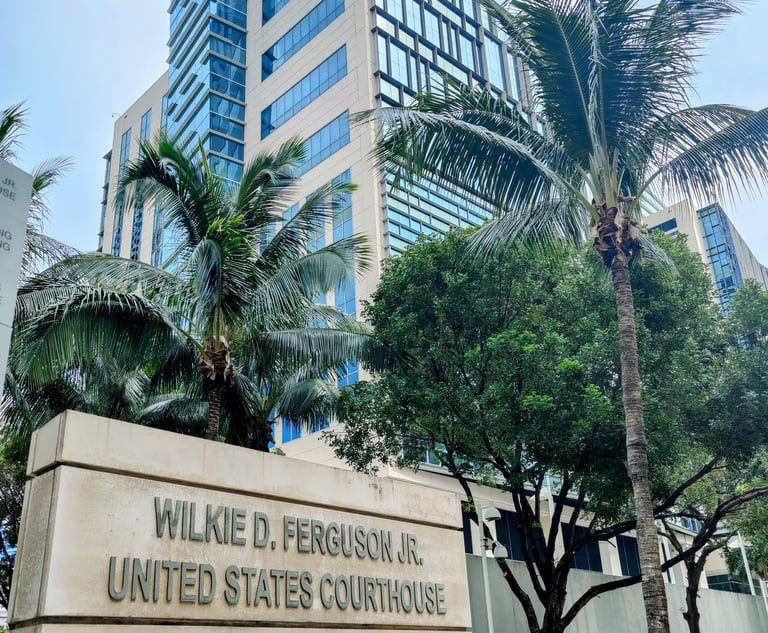 Littler Mendelson attorney Jonathan Beckerman. Courtesy photo
Littler Mendelson attorney Jonathan Beckerman. Courtesy photoLittler Mendelson Shareholder Jonathan Beckerman Helps Produce Defense Verdict for Lipman and Lipman
Immokalee-based business Lipman and Lipman Inc. prevailed in a whistleblower suit brought against it by Brian Bishop, its former chief information officer.
July 01, 2019 at 10:00 AM
5 minute read
Litigators with international labor law firm Littler Mendelson helped procure a defense verdict for a Florida agriculture company facing a whistleblower complaint filed by a disgruntled former employee.
On May 24, a jury in Collier County Circuit Court returned a favorable verdict to produce company Lipman and Lipman Inc. The Immokalee-based business had been named as a defendant in a lawsuit brought by Brian Bishop, Lipman's former chief information officer. As outlined in a July 2013 complaint, Bishop alleged he was unlawfully terminated by his longtime employer after raising concerns about Lipman's purported history of recruiting undocumented workers for the company's farm fields and packing houses.
“Bishop was terminated by Lipman, in violation of Florida's Whistleblower Act … because of his objection and refusal to participates in the practices of Lipman's illegal practice,” the complaint said. The suit characterized Bishop's termination as “malicious, extreme and outrageous.”
Jonathan Beckerman, who serves as Littler's office managing shareholder in Miami, and fellow Littler attorney Sherril Colombo represented Lipman in its legal battle with Bishop. Beckerman referred to Bishop's February 2012 letter claiming to know about illicit hiring practices within the company “a thinly veiled effort to save his job or set up this lawsuit” and noted he sought $3 million in damages before later lowering the number to $1.25 million.
“Bishop tried to play himself off as knight in shining armor when he was really just trying to set up the company,” he said. According to Beckerman, the decision to fire Bishop had been made back in August 2011 and he was aware of the possibility that his days with Lipman might soon be coming to a close. “Bishop was always an IT guy. He was never involved in hiring, firing, [or] immigration documentation. He always insisted he knew about immigration violations … [but] he couldn't point to one name of a single individual that we employed knowingly without documentation.”
Read the motion awarding attorney fees as a monetary sanction against the plaintiff:
Beckerman said that although Bishop had never been a stellar figure within the company during his 14 years of employment, his removal was hastened by the arrival of Robert Kent Shoemaker Jr. as CEO in September 2010.
“From the day that Kent took over the reins he recognized there was a gap in Bishop's abilities and talents,” Beckerman said, adding Shoemaker felt Bishop was lacking in management and leadership skills. “There's just no shortage of witnesses who came out of the woodwork saying the same thing.”
The attorney added Bishop “acknowledged to multiple people his days were numbered long before he sent a letter in which he engaged in whistleblowing activity.”
Beckerman said his client's case was built largely around Bishop's inability to produce documents that could corroborate his claims as well as testimony from Lipman employees who spoke to the plaintiff's less-than-ideal relationship with his employer. The attorney singled out Bishop's continual delays in turning over three portable hard drives containing company data he'd covertly downloaded as a particularly egregious example of the obstacles the defense faced. Beckerman also noted the plaintiff attempted to delete email records that were eventually obtained in addition to only producing two of the three hard drives that had been requested from him. Even after being hit with sanctions by the court, the plaintiff remained resolute on bringing the case to trial.
“It couldn't be settled for any reasonable amount,” Beckerman said. “The lawyers on the other side refused to get reasonable about this case. Their demands were never below seven figures- they believed this case was worth hundreds upon hundreds of thousands of dollars.” The attorney added that even when Bishop was caught trying to delete his emails, “they still kept doubling down more and more.”
“On directed verdict the judge said 'Your case is exceptionally weak,' and they still wouldn't back down,” he said. Bishop's legal counsel, GrayRobinson attorneys Richard Swift and Shaun Garry, did not respond to repeated requests for comment.
Even with the favorable outcome, Beckerman had no qualms calling the case “immensely frustrating.”
“It was a case where you had to painstakingly put together the details for the jury,” he said. Beckerman said there were several factors — including Bishop's extensive time with Lipman and a lack of written reprimands regarding his conduct — that could have sunk the case. He ultimately attributed the jury's verdict to the totality of the circumstances involved, including Bishop's attempts to conceal and destroy evidence.
“The big risk here was if the jury was going to lose sight of the forest from the trees … And they nailed it, they saw exactly through his nonsense,” Beckerman said. “He was just looking at this as his insurance policy, his retirement ticket, and he got anything but that, that's for sure.”
Case: Brian Bishop v. Lipman and Lipman, Inc. doing business as Lipman
Case No.: 11-2013-CA-002224-0001-XX
Description: Violation of the Florida Whistleblower Act
Filing date: July 23, 2013
Verdict date: May 24, 2019
Judge: Collier Circuit Judge Hugh D. Hayes
Plaintiffs attorneys: Richard J. Swift and Shaun M. Garry, GrayRobinson, Naples
Defense attorneys: Jonathan A. Beckerman, Sherril M. Colombo and Samantha E. Dunton-Gallagher, Littler Mendelson, Miami
Verdict amount: Defense verdict in case seeking $3 million in damages, then lowered to $1.25 million
This content has been archived. It is available through our partners, LexisNexis® and Bloomberg Law.
To view this content, please continue to their sites.
Not a Lexis Subscriber?
Subscribe Now
Not a Bloomberg Law Subscriber?
Subscribe Now
NOT FOR REPRINT
© 2024 ALM Global, LLC, All Rights Reserved. Request academic re-use from www.copyright.com. All other uses, submit a request to [email protected]. For more information visit Asset & Logo Licensing.
You Might Like
View All
'Close Our Borders?' Senate Judiciary Committee Examines Economics, Legal Predicate for Mass Deportation Proposal
3 minute read

'Stab Venequip in the Back': Caterpillar Faces $100M Lawsuit in Miami Federal Court
3 minute read
Another Roundup Trial Kicks Off in Missouri. Monsanto Faces 3 Plaintiffs
4 minute readTrending Stories
- 1Call for Nominations: Elite Trial Lawyers 2025
- 2Senate Judiciary Dems Release Report on Supreme Court Ethics
- 3Senate Confirms Last 2 of Biden's California Judicial Nominees
- 4Morrison & Foerster Doles Out Year-End and Special Bonuses, Raises Base Compensation for Associates
- 5Tom Girardi to Surrender to Federal Authorities on Jan. 7
Who Got The Work
Michael G. Bongiorno, Andrew Scott Dulberg and Elizabeth E. Driscoll from Wilmer Cutler Pickering Hale and Dorr have stepped in to represent Symbotic Inc., an A.I.-enabled technology platform that focuses on increasing supply chain efficiency, and other defendants in a pending shareholder derivative lawsuit. The case, filed Oct. 2 in Massachusetts District Court by the Brown Law Firm on behalf of Stephen Austen, accuses certain officers and directors of misleading investors in regard to Symbotic's potential for margin growth by failing to disclose that the company was not equipped to timely deploy its systems or manage expenses through project delays. The case, assigned to U.S. District Judge Nathaniel M. Gorton, is 1:24-cv-12522, Austen v. Cohen et al.
Who Got The Work
Edmund Polubinski and Marie Killmond of Davis Polk & Wardwell have entered appearances for data platform software development company MongoDB and other defendants in a pending shareholder derivative lawsuit. The action, filed Oct. 7 in New York Southern District Court by the Brown Law Firm, accuses the company's directors and/or officers of falsely expressing confidence in the company’s restructuring of its sales incentive plan and downplaying the severity of decreases in its upfront commitments. The case is 1:24-cv-07594, Roy v. Ittycheria et al.
Who Got The Work
Amy O. Bruchs and Kurt F. Ellison of Michael Best & Friedrich have entered appearances for Epic Systems Corp. in a pending employment discrimination lawsuit. The suit was filed Sept. 7 in Wisconsin Western District Court by Levine Eisberner LLC and Siri & Glimstad on behalf of a project manager who claims that he was wrongfully terminated after applying for a religious exemption to the defendant's COVID-19 vaccine mandate. The case, assigned to U.S. Magistrate Judge Anita Marie Boor, is 3:24-cv-00630, Secker, Nathan v. Epic Systems Corporation.
Who Got The Work
David X. Sullivan, Thomas J. Finn and Gregory A. Hall from McCarter & English have entered appearances for Sunrun Installation Services in a pending civil rights lawsuit. The complaint was filed Sept. 4 in Connecticut District Court by attorney Robert M. Berke on behalf of former employee George Edward Steins, who was arrested and charged with employing an unregistered home improvement salesperson. The complaint alleges that had Sunrun informed the Connecticut Department of Consumer Protection that the plaintiff's employment had ended in 2017 and that he no longer held Sunrun's home improvement contractor license, he would not have been hit with charges, which were dismissed in May 2024. The case, assigned to U.S. District Judge Jeffrey A. Meyer, is 3:24-cv-01423, Steins v. Sunrun, Inc. et al.
Who Got The Work
Greenberg Traurig shareholder Joshua L. Raskin has entered an appearance for boohoo.com UK Ltd. in a pending patent infringement lawsuit. The suit, filed Sept. 3 in Texas Eastern District Court by Rozier Hardt McDonough on behalf of Alto Dynamics, asserts five patents related to an online shopping platform. The case, assigned to U.S. District Judge Rodney Gilstrap, is 2:24-cv-00719, Alto Dynamics, LLC v. boohoo.com UK Limited.
Featured Firms
Law Offices of Gary Martin Hays & Associates, P.C.
(470) 294-1674
Law Offices of Mark E. Salomone
(857) 444-6468
Smith & Hassler
(713) 739-1250






